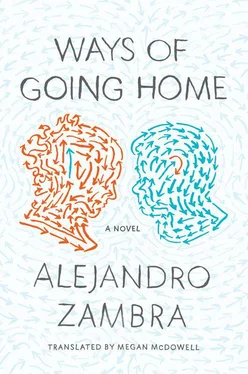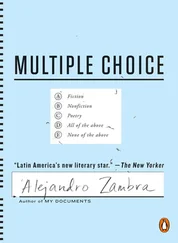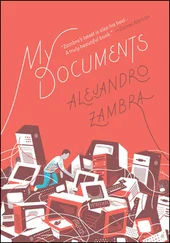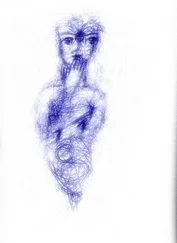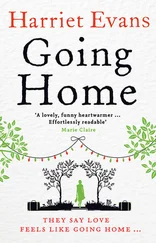They told her when she was little, and later — for many years — they continued telling her the story of the fever, which wasn’t even a story. It was merely a moment, the last one, although no one knew it would be the last one: in 1974, when Claudia had been alive for eleven months, Nacho went to see her because she had been sick for too many hours. The fever broke immediately. “It’s a miracle,” said the adults that afternoon, laughing. And that’s what it became, a slight, insignificant miracle: to lower a little girl’s fever, only that, on the afternoon when they saw him for the last time — for they never saw him dead, his body never appeared.
“In my family there are no dead,” I say. “No one has died. Not my grandparents, not my parents, not my cousins, no one.”
“You never go to the cemetery?”
“No, I never go to the cemetery,” I answer with a complete sentence, as if I were learning to speak a foreign language and I’d been instructed to answer that way.
“I have to go, I’d rather get back early to my father’s house.” A gesture of her lips gives her away immediately: it’s not her father’s house anymore, now it’s hers and Ximena’s. I go with her, hoping she’ll invite me in for coffee, but she says goodbye at the gate with a bright smile and a hug.
On the way back home I remember a scene in college, one afternoon when we were smoking weed and drinking a sticky wine with melon. I’d spent the afternoon with a group of classmates, and we were exchanging family stories in which death appeared with urgent insistence. Of all those present I was the only one who came from a family with no dead, and that realization filled me with a strange bitterness: my friends had grown up reading the books that their dead parents or siblings left behind in the house. But in my family there were no dead and there were no books.
I come from a family with no dead, I thought as my classmates told their childhood stories. At that moment I had a strong memory of Claudia, but I didn’t want or didn’t dare to tell her story. It wasn’t mine. I knew little, but at least I knew that: no one could speak for someone else. That although we might want to tell other people’s stories, we always end up telling our own.
I want to let a few days go by before I call her and suggest getting together again. But I’m impatient and I do it right away. She doesn’t seem surprised. We arrange to meet the next morning, in Intercommunal Park. I get there early but I see her from far away, sitting on a bench and reading. She looks beautiful. She is wearing a jean skirt and an old black shirt with big blue letters that say LOVE SUCKS.
Some kids playing hooky come over to ask for a light. “I didn’t smoke at that age,” Claudia says to me.
“I did,” I answer. I tell her that I started smoking at twelve. Sometimes when I was walking with my father and he lit a cigarette, I would ask him to put it out, saying it was bad for him and he was going to die of cancer. I did it to trick him, so he wouldn’t suspect that I smoked too, and he would look at me apologetically and explain that smoking was a vice and that vices were the signs of human weakness. I remember how I liked it when he suddenly confessed his weakness, his vulnerability.
“I, on the other hand, only saw my father smoke one time,” says Claudia as we wander through the park. “One day I got home early from school and he was in the living room talking to my mother. I was so happy to see him. I lived hoping to see him. My father hugged me and maybe it was a long hug, but I felt like he let go of me quickly, as if we weren’t allowed to have that contact, either. Then I realized he had a lit cigarette in his right hand. It unsettled me. It was like he really was a different person. As if Roberto wasn’t smoking, Raúl was.”
“He also smoked the night of the earthquake, with my dad,” I remind her. “I think my dad offered yours a cigarette and they smoked together, and talked.”
“Really?” asks Claudia, incredulous, as she fixes her hair. “I don’t remember that. But I remember you,” she says.
“Were you really looking for someone to spy on your father?”
“No,” she says. “I didn’t know my father lived there. It was a very ambiguous situation. The night of the earthquake I was alone with my mother, because Ximena had gone to my grandmother’s. Back then Ximena spent a lot of time with Grandma, she practically lived with her. A brick wall fell and broke the big front window, so we couldn’t sleep there. I remember we were desperate, we went out walking and I didn’t know we were looking for my dad, and that he was also looking for us. I don’t know if we took different routes or if we passed each other by. When we finally saw him on a corner I couldn’t believe it. I had a little flashlight, a toy, which they’d given to me years before. I remember I shined it on his face and saw his eyes were a little wet. We hugged and then he brought us to the fire. Before dawn the three of us left for the house in La Reina, in his car.”
“The Fiat 500,” I say.
“The Fiat 500, yes,” she answers.
It affected Claudia a lot to find out that her father lived close by. She was sick of secrets, and at the same time she intuited numerous dangers, huge and imprecise dangers. She liked seeing me there, with the adults around the fire. “You stayed quiet, you observed. I was like that too, silent. I started following you without a clear purpose, and little by little I came up with a plan.”
Neither did Claudia know exactly why she was spying, what she wanted to find out. But when she learned, through me, that Roberto was hiding people in the house, she wasn’t surprised.
“And did you think your father had a lover?”
“I didn’t know what to think. When we talked that time I lost it, the truth is I knew very little about my father. Then I thought it had to be Ximena. I didn’t figure you would follow her like that, but it made me so mad to know she saw my father more than I did. She and my father, we said later, half joking, were the revolutionaries. My mother and I, on the other hand, were the reactionaries. We could joke about it, but it still hurt and I guess it even hurts now.”
When Ximena saw that a boy, that I, was following her, she had no doubt that her sister had sent me. Claudia found herself obliged to confess that she was the one who had asked me to spy on her father. They scolded her, emphatically at first and then lovingly. An argument began in which everyone blamed someone else. “I didn’t want to be responsible for those shouting matches, but I was,” says Claudia, and then there is a long and uncertain pause. For ten minutes it seems like she is about to speak, but she can’t bring herself to. Finally, she says: “I really feel like eating some chocolate ice cream.”
We haven’t seen each other for a week but I call her every day, and I have the impression Claudia waits for those calls. One night, very late, she’s the one who calls me. “I’m outside,” she says. “Ximena threw me out. She says the house is hers. She called me a foreigner and a whore.”
Claudia cries with the precise movements of someone trying not to sob. I hug her, I offer her tea, and we listen to music while I think about the reasons Ximena might have for calling her a whore. I almost ask, but I keep quiet. I tell her she can stay with me, that there’s only one bed but I can sleep on the armchair. “It’ll just be one night,” she answers. “But I want us to sleep together. That way my sister will be right, I’ll be a whore.”
Claudia’s eyes brighten: she gets her laughter back, her beauty. I offer her some cheese and I open a bottle of wine. We talk and drink for hours. I like how she moves around the house. She occupies the space as if recognizing it. She changes one chair for another, she stands up, suddenly she sits on the floor and stays for a while with her hands on her ankles.
Читать дальше
